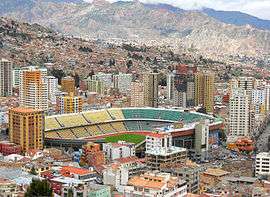Estadio Hernando Siles
 | |
| Full name | Estadio Hernando Siles |
|---|---|
| Location | Avenida Saavedra,[1] La Paz, Bolivia |
| Capacity | 42,000 |
| Field size | 68 m * 105m |
| Surface | Grass |
| Opened | 1930 |
| Tenants | |
|
Club Bolivar The Strongest Universitario de La Paz Chaco Petrolero Mariscal Braun Fraternidad Tigres Academia de Balompié Boliviano Club 31 de Octubre Bolivia national football team | |
Estadio Hernando Siles is a sports stadium in La Paz, Bolivia. It is the country's largest sports complex with a capacity of 41,143 seats. It is named after Hernando Siles Reyes, the 31st President of Bolivia (1926–1930). The stadium is located in the Miraflores borough of La Paz, at an altitude of 3,637 metres (11,932 feet) above sea level, making it one of the highest professional stadiums in the world. The Stadium was opened in 1931 with a match between The Strongest and its classic rival, Universitario, with The Strongest winning 4–1. It is the home ground of three major Bolivian league football clubs, Club Bolivar, The Strongest and La Paz F.C. as well as several smaller top sides: Universitario de La Paz, Chaco Petrolero and Mariscal Braun. The stadium also host lower league clubs: Fraternidad Tigres and Academia de Balompié Boliviano.
History
The stadium has been the site of historic moments in Bolivian football history, including Bolivia's 2–0 defeat of Brazil in the 1993 qualifiers for 1994 World Cup, Brazil's first defeat in 40 years of playing the qualifiers. Another such moment of this history occurred on April 1, 2009 when Bolivia defeated Argentina 6–1, inflicting the worst defeat for Argentina in 60 years. 6 months after, on October 11 (in the same qualifying group for 2010 World Cup), Bolivia defeated 2–1 an underweight Brazil.
FIFA Altitude Ban
Until May 2007, FIFA, football's international governing body, accepted the stadium as a World Cup Qualifying venue, despite protests from visiting teams that the altitude gave the Bolivian national team an unfair advantage against opponents who had only a few days to acclimatise before playing. On May 27, 2007, FIFA declared that no World Cup Qualifying matches could be played in stadiums above 8,200 feet (2,500 m) above sea level.[2] Some, including Bolivian President Evo Morales and Diego Maradona, reacted by claiming the new measure discriminated primarily against high-altitude nations in Latin America, especially those in the Andes.[3] The "Hernando Siles" became a symbol of the Bolivian struggle against FIFA's ban on games at altitude. After a month of campaigning against the ban, FIFA raised the altitude limit from 2500 meters to 3000 meters on June 27, 2007. The next day, FIFA also announced a special exemption for the Estadio Hernando Siles, allowing the stadium to continue holding World Cup qualifying matches.[4] During 2006, 2010 and 2014 World Cup qualifyings together, Bolivia had ten home wins and eight home draws, and only two away draws and no away win.
Events
The American rock band Bon Jovi played a concert at the stadium on November 9, 1993 during I'll Sleep When I'm Dead Tour. It was the band´s first concert in the country.
Enrique Iglesias played a concert at the stadium on July 2, 2011 during Euphoria Tour.
The hard rock band Guns N' Roses made a concert at the stadium on April 12, 2014 during its "South American Tour".
References
- ↑ http://www.worldofstadiums.com/south-america/bolivia/estadio-hernando-siles/
- ↑ "Focus on 57th FIFA Congress". FIFA. 2007-05-27. Archived from the original on 2007-10-01. Retrieved 2007-05-29.
- ↑ Associated Press (2007-05-28). "Anger Echoes in South America After FIFA Bans Games at Altitude". The New York Times. Retrieved 2007-05-29.
- ↑ Reuters (2007-07-28). "FIFA excludes La Paz from altitude ban – report". ESPN soccernet. Retrieved 2007-07-29.
External links
![]() Media related to Estadio Hernando Siles at Wikimedia Commons
Media related to Estadio Hernando Siles at Wikimedia Commons
| Preceded by Centenario Stadium Montevideo |
Copa América Final Venue 1997 |
Succeeded by Estadio Defensores del Chaco Asunción |
Coordinates: 16°29′58″S 68°07′22″W / 16.49944°S 68.12278°W